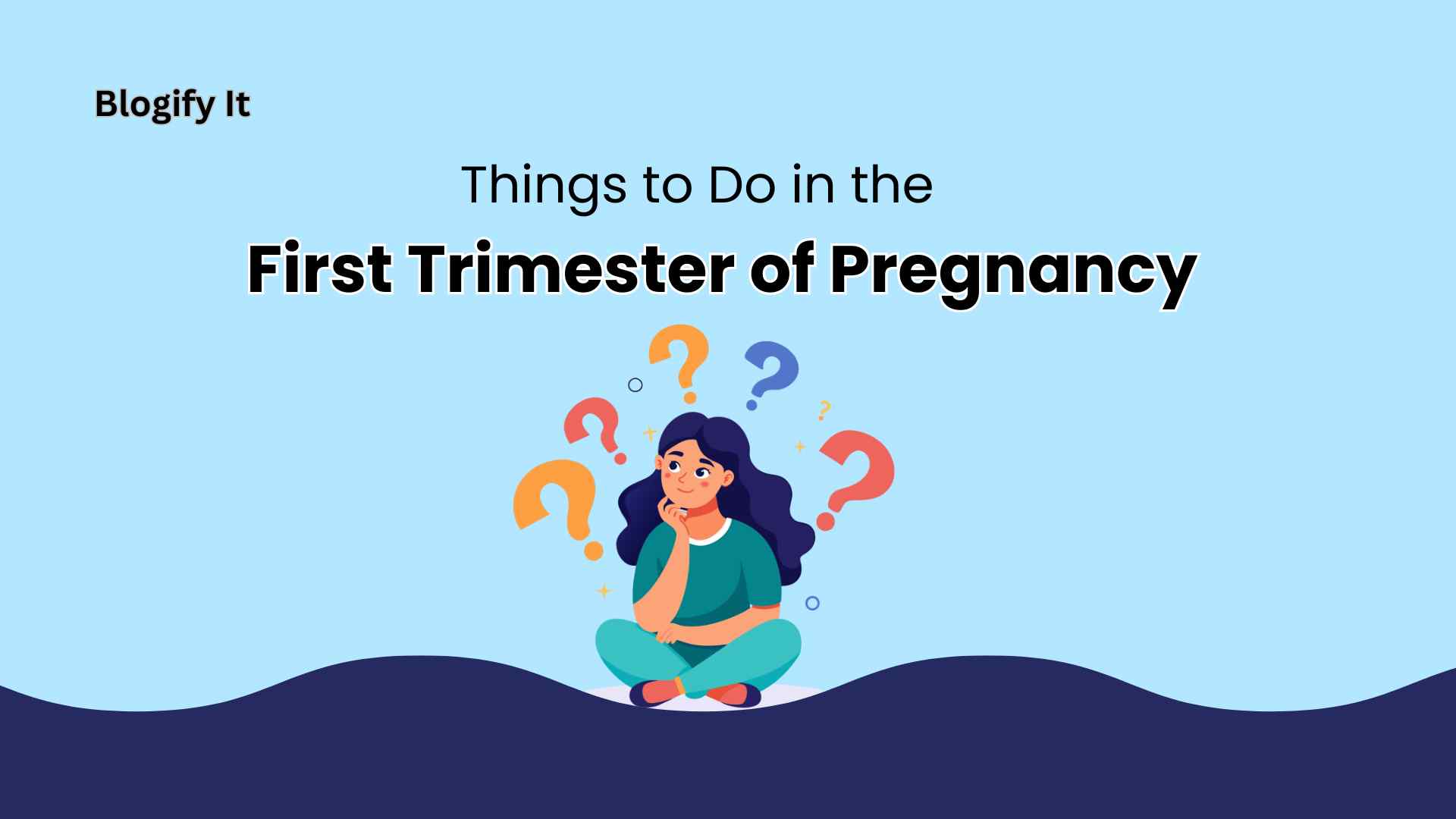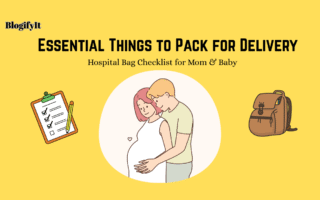Summary: Are you pregnant? Do you know things to do in the first trimester of pregnancy? If no, this blog is for you. Today, we’ll discuss some key things that can make your pregnancy super-easy. So, ready on!
If you landed here while searching for “things to do in the first trimester of pregnancy,” then continue reading! But first things first, congratulations! We know how it feels when you first find out you’re pregnant. A whirlwind of emotions, from sheer joy and excitement to a tinge of anxiety about the unknown that lies ahead.
During those early days and weeks, your mind is likely racing with questions: “What should I expect? ”How will my body change? What steps should I take to ensure a healthy pregnancy?” It’s perfectly normal to feel overwhelmed, especially if this is your first time embarking on this incredible journey.
Take a deep breath and know that you’re not alone. In this comprehensive blog post, we’ll explore the essential things to do in the first trimester of pregnancy. But let’s start with the basics.
What is the First Trimester of Pregnancy?
The first trimester is the initial stage of pregnancy. It’s from week 1 to week 12. During this time, your body undergoes remarkable changes as it adjusts to accommodate the growing life inside you. While every pregnancy journey is unique, there are essential steps you can take to nurture your well-being and that of your baby.
What to Do in First Trimester of Pregnancy
Here are some things to do in the first trimester of pregnancy. We’ve divided
Health and Well-Being

1. Don’t Forget Your Vitamins
Start taking folic acid right away to help prevent severe birth defects in the baby’s brain and spine. You need 400 micrograms per day of this B vitamin. Vitamin D is also super important for pregnancy health, so take a 10-microgram supplement daily. A prenatal vitamin can cover your other nutrient needs, like iron, calcium, and vitamin A.
2. Check Before Medicating
Some medicines, even over-the-counter ones, could be unsafe for your growing baby. Always ask your doctor or pharmacist before taking anything while pregnant, as certain drugs can cross the placenta and potentially cause birth defects or other issues.
3. Time to Quit Smoking
Do you know women who smoke during pregnancy have higher chances of delivering babies early? Premature delivery can lead to death, disability, or disease among newborns.
Smoking raises major risks like miscarriage, preterm birth, low birth weight, and birth defects – and exposes babies to hundreds of toxic chemicals. As hard as it is, quitting is one of the best things you can do for your pregnancy. Ask your doctor about stop-smoking resources like counseling, nicotine replacements, or medications.
4. No Alcohol Allowed
Based on research, pregnant women who smoke have a higher risk of stillbirth. The tragic event where an unborn child’s life is lost after the 20th week of gestation or during the birthing process is known as stillbirth.
Experts recommend avoiding alcohol completely during pregnancy since there’s no known safe amount. Any alcohol passes through the placenta to your developing baby, potentially causing miscarriage, stillbirth, or fetal alcohol spectrum disorders. But you can discover many tasty non-alcoholic versions of your favorite cocktails, wines, and beers!
5. Watch Your Caffeine
You can still have some coffee, but limit yourself to 200mg of caffeine daily from all sources. That’s about two small 8oz cups of regular coffee. Too much caffeine has been linked to an increased risk of miscarriage, premature birth, and low birth weight.
6. Eating for Two
Eating nutritious foods gives you and your baby all the nutrients you need to thrive. But you actually don’t require extra calories until the third trimester. Focus on getting enough protein, calcium, iron, folate, and other vital nutrients from foods like lean meat, eggs, dairy, fruits, veggies, and whole grains.
Avoid unpasteurized dairy, raw/undercooked meat, deli meat, raw eggs, raw fish, and foods with raw ingredients that can contain harmful bacteria like Listeria.
7. Coping with Morning Sickness
If you’re battling nausea and vomiting, snack on bland, easy-to-digest foods like crackers, toast, and rice throughout the day. Stay hydrated with small sips of water, ginger ale, or electrolyte drinks. Get plenty of rest and avoid strong smells that may trigger nausea. Call your doctor if you can’t keep anything down for over 24 hours, as you may need treatment for severe morning sickness.
8. Know the Warning Signs
Some mild tummy cramping and aches are normal as your belly expands. But alert your doctor immediately if you have cramps accompanied by bleeding, fever, severe pain, dizziness, or contractions – these could signal miscarriage, preterm labor, a UTI, or other complications.
9. Move That Body
As long as your doctor gives the okay and you feel up for it, you can continue your normal exercise routine while pregnant within reason. Staying active during pregnancy helps reduce back pain and gestational diabetes risk, prepares your body for childbirth stamina, and can improve your mood and energy levels.
10. Household Responsibilities
When using harsh chemical cleaners, ensure the area is well-ventilated and wear gloves to avoid inhaling toxic fumes. Wash your hands thoroughly after cleaning, too. Be aware of any toxic exposures or strenuous activities at your workplace that could potentially affect your pregnancy, too.
11. Strengthen Your Pelvic Floor
Do Kegel exercises (contracting the pelvic floor muscles) daily to strengthen this area and prevent issues like accidental urine leakage after delivery. Strong pelvic muscles can also make sex more enjoyable and help during pushing in labor. Ask your doctor for guidance on how to properly do these exercises if needed.
Appointments and Preparations

12. Meeting Your Midwife
As soon as you get that positive pregnancy test, tell your doctor! They’ll help you schedule your first big appointment with a midwife around 8-12 weeks. This crucial “booking” visit lets the midwife get to know all about your health history and any potential risk factors. Be ready to answer lots of questions about you, your partner, and both your families’ medical backgrounds. It may take 1-2 hours, but this lets your midwife fully understand your unique situation.
13. Your First Ultrasound
Around 8-14 weeks, you’ll see your baby for the first time at the dating scan ultrasound! Be prepared—it’s such an amazing moment when you hear that tiny flickering heartbeat. The sonographer will take measurements to estimate your due date and check that the baby is developing properly.
14. To Tell or Not to Tell?
Some parents-to-be can’t wait to share their exciting pregnancy news right away, while others prefer to wait until after the first trimester is over when risks are lower. There’s no right or wrong—do what feels most comfortable for you and your situation. Keep in mind that if you have a physically demanding job, you’ll need to disclose it eventually.
15. Childbirth Class Sign-Ups
Register for birthing and newborn care classes early, as they tend to fill up fast closer to your due date. A prepared childbirth series provides invaluable information on what to expect during labor, coaching for your partner, pain management techniques, and caring for your newborn. Online classes are also an option for flexibility.
16. Involving Your Partner
Even if you’re physically pregnant, help your partner feel included and bonded with your baby from the start. Share information from your appointments about the amazing changes happening, the baby’s development milestones, and what they might expect. Encourage them to read, sing, or play music for your belly, too.
17. Prepping Your Finances
Having a baby comes with comes with significant expenses for diapers, clothes, gear, health costs, and more. Look for ways to save money, like buying high-quality used baby items, cutting other spending, increasing your income if possible, and making a realistic budget. Being financially prepared can relieve a lot of stress.
Self-care and Bonding

18. Treat Yourself to New Bras
With tender, growing breasts, you’ll want to get professionally fitted for some super supportive and comfy maternity and nursing bras in a bigger cup size. Having the right undergarments can make a huge difference in avoiding pain and providing the lift and shaping you’ll need.
19. The Gift of Massage
Pregnancy can take a major toll physically and emotionally. Treat yourself to a prenatal massage occasionally by a certified therapist who can position you safely. Or ask your partner for regular relaxing back, foot, or neck rubs at home. Massage provides relief and pampering during this special time.
20. Nurturing Mental Health
The emotional rollercoaster of pregnancy is totally normal, but don’t ignore signs of anxiety, depression, persistent sadness, anger, or worry. Reach out to your doctor if you’re struggling – you don’t have to go it alone. They can provide counseling, therapy, medication, or other treatments to support your mental well-being.
22. Tracking Baby’s Milestones
Each week brings new and exciting developmental milestones for your little one, from growing organs to hiccupping. Following your baby’s growth progression can make the incredible journey feel even more real and help connect you to the tiny life inside. Let the wonder and awe soak in!
Now, you know things to do in the first month of pregnancy, let’s gather some more information that will help you during this pregnancy journey.
What Changes You Will See In Your Body During the First 3 Months of Pregnancy?
You will commonly experience several pregnancy symptoms during the first trimester, typically lasting from week 1 to week 12 of pregnancy. Here are some of the most common ones:
- Missed periods – This is often the first sign that you’re pregnant.
- Tender, swollen breasts – Your breasts prepare to produce milk for the baby.
- Feeling very tired – Higher hormone progesterone levels can make you sleepy.
- Itching on skin– You may or may not feel itchy skin during the first trimester due to the stretching of the skin and increased blood supply to the skin.
- Morning sickness – Nausea and vomiting can happen at any time and are caused by rising hormones.
- Frequent urination – The growing uterus puts pressure on your bladder.
- Food cravings or dislikes – Hormonal changes can affect your sense of taste and smell.
- Mood swings – The shift in hormones can cause emotional ups and downs.
The baby’s major organs and body systems develop during these first 3 months. By the end of the first trimester, your baby is around 3 inches long and weighs about an ounce. Your body is working hard to nurture the new life growing inside you. These changes are normal and a sign of a healthy pregnancy.
When to Meet Your Healthcare Provider and What to Expect?
You should schedule your first prenatal appointment as soon as you think you might be pregnant. Most healthcare providers recommend the following:
- See your provider as soon as possible after a positive pregnancy test, ideally before you are 8 weeks pregnant.
- At this first visit, your provider will likely confirm your pregnancy and estimate your due date.
- You’ll have tests to check your overall health and screen for any potential risks.
- Your provider will discuss what to expect during pregnancy and answer any questions.
- After the first visit, you’ll typically have prenatal check-ups once a month until around 28 weeks.
- From 28 weeks until 36 weeks, you’ll see your provider every 2 weeks.
- During the last month of pregnancy, you’ll have weekly check-ups.
- And not to mention, you must contact your providers instantly if you experience any concerning symptoms like vaginal bleeding, severe abdominal pain, or contractions before 37 weeks. These could be signs of an emergency requiring prompt evaluation.
Regular prenatal care is essential for monitoring your and your baby’s health throughout the pregnancy. Don’t hesitate to contact your provider between appointments if you have any concerns.
What Test Will Be Done the First 3 Months of Pregnancy?
You’ll have 2-3 visits with your doctor in the first 3 months. This first visit is very important. Your doctor will:
- Ask about your medical history and your family’s medical history.
- Calculate your due date.
- Do a physical exam to check your weight and blood pressure.
- Do a pelvic exam.
- Do a Pap test if needed.
- Check for sexually transmitted infections.
- Test your urine for bacteria, protein, and sugar.
- Take blood tests to check hormone levels and iron levels and check for certain diseases.
- Listen to the baby’s heartbeat.
Some doctors use an ultrasound at this first visit. An ultrasound shows if you are having more than one baby. For the ultrasound, the doctor puts a wand inside your vagina.
Most pregnant women get at least one ultrasound in the first 3 months. But the exact timing depends on your doctor.
Other Tests
Your doctor may suggest extra tests to check if you or your baby are at higher risk for health problems. For example, a test to check for Down syndrome.
Talk to your doctor about any tests they recommend. Don’t be afraid to ask questions if you don’t understand something.
Conclusion
That’s all for today. Here is the final checklist of things to do in the first trimester of pregnancy:
- Take a pregnancy test
- Start prenatal vitamins
- Find an ob-gyn or midwife
- Schedule first prenatal visit (around 8 weeks)
- Discuss prenatal genetic testing options
- Review medications with your provider
- Consider non-invasive prenatal testing (NIPT) after 10 weeks
- Attend first trimester screening/nuchal translucency ultrasound (11-14 weeks)
- Review health insurance coverage for prenatal/postpartum care
- Start a healthy, balanced pregnancy diet
Make sure you stay hydrated and get plenty of rest. Don’t hesitate to contact your healthcare provider with any questions or concerns. The first trimester can be exciting yet overwhelming, but taking care of yourself and your little one is the top priority. I wish you a healthy and happy pregnancy journey!




